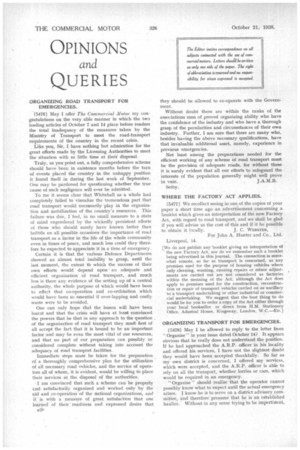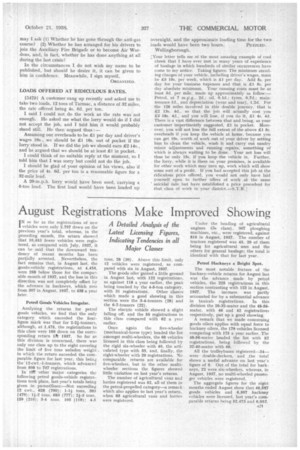OPINIONS
Page 54

Page 55

If you've noticed an error in this article please click here to report it so we can fix it.
and
QUERIES
ORGANIZING ROAD TRANSPORT FOR EMERGENCIES.
154761 May I offer The Commercial Motor my congratulations on the very able manner in which the two leading articles of October 7 and 14 place before readers the total inadequacy of the measures taken by the Ministry of Transport to meet the road-transport requirements of the country in the recent crisis.
, Like you, Sir, I have nothing but admiration for the great efforts made by the Licensing Authorities to meet the situation with so little time at their disposal.
Truly, as you point out, a fully comprehensive scheme should have been in existence months before the turn of events placed the country in the unhappy position it found itself in during the last week of September. One may be pardoned for questioning whether the true cause of such negligence will ever be admitted.
To me it seems clear that, Whitehall as a whole had completely failed to visualize the tremendous part that road transport would necessarily play in the organization and mobilization of the country's resources. This failure was due, I feel, in no small measure to a state of mind engendered by the wickedly persistent efforts of those who should surely have known better than belittle on all possible occasions the importance of road transport as a factor in the life of the whole community even in times of peace, and much less could they therefore be expected to appreciate it in a time of emergency.
Certain it is that the various Defence Departments showed an almost total inability to grasp, until the last moment, the extent to which the success of their own efforts would depend upon' an adequate and efficient organization of road transport, and much less is there any evidence of the setting up of a central authority, the whole purpose of which would have been to effect that co-operation and co-ordination which would have 'been so essential if over-lapping and costly waste were to be avoided.
One can only hope that the lesson will have been learnt and that the crisis will have at least convinced the powers that be that in any approach to the question of the organization of road transport they musl first of all accept the fact that it is bound to be an important factor and may be even the most vital of our resources, and that no part of our preparation can possibly be considered complete without taking into account the adequacy of road transport facilities.
Immediate steps must be taken for the preparation of a thoroughly comprehensive plan for the utilization of all necessary road vehicles, and the service of operators all of whom, it is evident, would be willing to place their services at the disposal of the authorities.
I am convinced that such a scheme can be properly and satisfactorily organized and worked only by the aid and co-operation'of the national organizations, and it is with a measure of great satisfaction that one learned Of their readiness and expressed desire that
e211 they should be allowed to co-operate with the Government.
Without doubt there are within the ranks of the associations men of proved organizing ability who have the confidence of the industry and who have a thorough grasp of the pecularities and circumstances of their own industry. Further, I am sure that there are many who, besides having the above necessary qualifications, have that invaluable additional asset, namely, experience in previous emergencies.
Not least among the preparations needed for the efficient working of any scheme of road transport must be the provision of adequate roads, for without these it is surely evident that all our efforts to safeguard the interests of the population generally might well prove
in vain. J.A.M.B. Selby.
WHERE THE FACTORY ACT APPLIES.
154771 We recollect seeing in one of the copies of your paper a short time ago an advertisement concerning a booklet which gives an interpretation of the new Factory Act, with regard to road transport, and we shall be glad if you will advise us the cost of this and if it be possible to obtain it locally. J. C. WEBSTER, For John A. Hunter and Co., Ltd.
Liverpool, 14.
[We do not publish any booklet giving an interpretation of the new Factory Act, nor do we remember such a booklet being advertised in this journal. The connection is somewhat remote, so far as transport is concerned, as any premises used for the purpose of housing vehicles where only cleaning, wasning, running repairs or minor adjustments are carried out are not considered as factories within the meaning of the Act, although the Act does apply to premises used for the construction, reconstruction or repair of transport vehicles carried on as ancillary to a transport undertaking or other industrial or commercial undertaking. We suggest that the hest thing to do would be for you to order a copy of the Act either through your local bookseller, or direct from H.M. Stationery Office, Adastral House, Kingsway, London, W.C.—En.]
ORGANIZING TRANSPORT FOR EMERGENCIES.
154781 May I be allowed to reply to the letter from " Organise" in your issue dated October 141 It appears obvious that he really does not understand the position. If he had approached the A.R.P. officer in his locality and offered his services, I have not the slightest doubt they would have been accepted thankfully. So far as my own district is concerned, I offered my services, which were accepted, and the A.R.P. officer is able to rely on all the transport, whether lorries or cars, which would be required in an emergency. "
Organise" should realize that the operator cannot possibly know what to expect until the actual emergency arises. I know he is to serve on a district advisory committee, and therefore presume. that he is an established haulier. Without in any sense trying to be impertinent,
may I ask (1) Whether he has gone through the anti-gas course? (2) Whether he has arranged for his drivers to join the Auxiliary Fire Brigade or to become Air Wardens, and, in fact, whether he has done anything at all during the last crisis?
In the circumstances I do not wish my name to be published, but should he desire it, it can be given to him in confidence. Meanwhile, I sign myself,
ORGANIZED.
LOADS OFFERED AT RIDICULOUS RATES.
15479) A customer rang up recently and asked me to take two loads, 12 tons of Tarmac, a distance of 32 miles, the rate offered being 4s. 6d. per ton.
I said I could not do the Work as the rate was not enough. He asked me what the lorry would do if I did not accept the job, and I told him it would probably stand still. He then argued thus:— Assuming our overheads to be £1 per day and driver's wages 10s., we should be £1 10s. out of pocket if the lorry stood in. If we did the job we should earn £2 14s., and he argued that we should be at least £1 in pocket.
I could think of no suitable reply at the moment, so I told him that I was sorry but could not do the job.
I should be glad of your opinion of his views, also if the price of 4s. 6d. per ton is a reasonable figure for a 32-mile lead.
A 20-m.p.h. lorry would have been used, carrying a 6-ton load. The first load would have been loaded up overnight, and the approximate loading time for the two
loads would have been two hours. PUZZLED. Wellingborough.
:Your letter tells me of the most amazing example of coca cheek that I have ever met in many years of experience of haulage in which hundreds of similar occurrences have come to my notice. Taking figures: The minimum standing charges of your vehicle, including driver's wages, must
• be 25 10s. per week, which is 21 per day. Add 5s. per day for your business expenses and that is 21 5s. per day absolute minimum. Your running costs must be at least 5d. per mile, made up approximately as follow:— Petrol, at 7 m.p.g., 2d.; oil, 0.1d.; tyres, 0.7d.; maintenance Id., and depreciation (wear and tear), 1.2d. For the 128 miles involved in this double journey, that is 22 13s. 4d., so that the job will actually cost you 23 .18s. 4d., and you will lose, if you do it, 21 4s. 4d. There is a vast difference between that and being, as your customer impertinently suggested, 21 in pocket. Moreover, You will not lose the full extent of the above Al 5$. overheads if you keep the vehicle at home, because you can get 10s. worth of work out of your driver by setting him to clean the vehicle, wash it and carry out sundry minor adjustments and running -repairs, something of which is always waiting to be done. Your net loss will thus be only 15s. if you keep the vehicle in. Further, the lorry, while it is there on your premises, is available for other work which may turn up, work which will show some sort of a profit. If you had accepted this job at the ridiculous price offered, you would not only have laid yourself open to further offers of work at the same • suicidal rate but have established a price precedent for that class of work in your district.--S.T.R.]




























































































